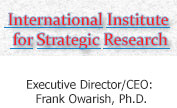Strategic thinking; strategic action for result: methodological considerations
The IISRT concept is about helping leaders make a difference in the lives of people, turning setbacks into opportunities, maximizing opportunities, ingeniously and generously. Here are key methodological guidance:
| Critical thinking is both an art and a science and has developed significantly in recent years; leaders , managers and scholars stand to benefit from the use of available tools (The Foundation for Critical Thinking) and they could also share their experience and help develop these tools further. |
| Lateral thinking: Another approach has also been highly used as a tool to find creative solutions to all kinds of problems, find more |
| Lessons Learned (a strategic methodology involves learning from experience; from mistakes so as not to repeat them and enhancing/improving good practices) |
| Sources of Inspiration (equal to sources of wisdom; often a citation can trigger thought and action) |
Persistence: often complex tasks require persistence i.e. sustained effort; persistence may mean trying not just one way but several ways in order to get the needed results. A related concept is perseverance i.e. to keep on trying and not giving up. Worthwhile ventures always need persistence and perseverance.
| “Early in his career (Sir Francis Bacon) claimed ‘all knowledge as his province’ and afterwards dedicated himself to a wholesale revaluation and re-structuring of traditional learning. To take the place of the established tradition (a miscellany of Scholasticism, humanism, and natural magic), he proposed an entirely new system based on empirical and inductive principles and the active development of new arts and inventions, a system whose ultimate goal would be the production of practical knowledge for ‘the use and benefit of men’ and the relief of the human condition.” http://www.iep.utm.edu/b/bacon.htm |
| The key to making an idea stick: NEA Higher Education, Vol. 26, No. 2 Dec 2008, page 7, Under Best Practices: “in ‘Made to Stick’ (2007) Chip and Dan Heath demonstrate that the key to making an idea stick – i.e. understood, remembered and having a lasting impact – is to keep it simple by ‘finding the core of the idea'”. |
Knowledge is crucial to human progress; here is a foundation that is making a big difference in society through its knowledge center
| Art/Science of getting a large number of tasks done and/or to doing a large number of tasks: (1) manage time judiciously (2) multi-task (3) delegate as possible (4) bring in needed help (5) work in team (6) leverage computer systems e.g. use calendaring, use project management software (7) avoid procrastination (8) enjoy the action (9) feel good at being constructive |
| The strategic approach: strategic planning leading to strategic action and result |
